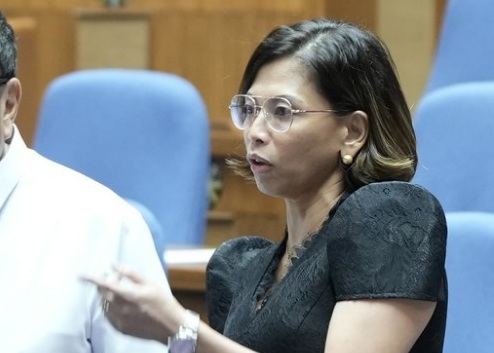At A Glance
- Marikina City 2nd district Rep. Stella Quimbo took it upon herself to correct what could be described as a misleading conclusion from the IBON Foundation in the ongoing discussions of Resolution of Both Houses (RBH) No.7.
 Marikina City 2nd Rep. Stella Quimbo (PPAB)
Marikina City 2nd Rep. Stella Quimbo (PPAB)
Marikina City 2nd district Rep. Stella Quimbo took it upon herself to correct what could be described as a misleading conclusion from the IBON Foundation in the ongoing discussions of Resolution of Both Houses (RBH) No.7.
Quimbo stood in plenary during the deliberations on Tuesday night, Feb. 27 with the aim of interpellating IBON Foundation Executive Director Sonny Africa. However, he didn't attend.
"Nung nagpresent ang IBON Foundation, ang una niyang sinabi ay (When the IBON Foundation made its presentation, the first thing that he said was), The Philippines is now among the least restrictive economies to foreign investments in the region," Quimbo said.
"Yan ang kanyang first slide na ikinagulat ko, kasi yan ang dahilan kung bakit tayo nandito ngayon (That was his first slide, which shocked me because that's the reason why we're here right now)," said the lady solon.
"We are amending the restrictive economic provisions of the Constitution. Marami na tayong nakitang mga pag-aaral at laging nababanggit ang OECD (Organisation for Economic Co-operation and Development) restrictiveness index," she said.
(We have seen numerous studies and they always bring up the OECD restrictiveness index.)
According to Quimbo, IBON made it appear in their particular slide that the Philippines had many sectors "in the green" or open to foreign investments.
Asked by Quimbo for her opinion, National Economic and Development Authority (NEDA) Undersecretary Rosemarie Edillon said of the slide in question: "If you look at the OECD study, it actually lists the Philippines as...182nd--third from the bottom na pinaka-restrictive in the world (among the most restricted in the world)."
Simply put, IBON Foundation "cherry-picked" the details of its case against RBH No.7, which called for economic-themed revisions to the Charter.
"Parang nagkaroon ng cherry-picking, parang namili ng sectors ma bukas na anyway. Halimbawa may telcos, mayroong retail trade, mayroong tourism, mayroong healthcare, mayroong power...railway, airports, etc. Yan naman ay bukas dahil during the 18th Congress kung naalala ninyo, inamyendahan natin ang Public Services Act," explained Quimbo.
(This was cherry-picking, the sectors highlighted were those that were open anyway. For example, telcos, retail trade, tourism, healthcare, power, railway, airports, etc. Those are open because if you remember, we amended the Public Services Act during the 18th Congress.)
"Pero kung titignan natin ay maraming mga sectors ang left out dito sa listing ng IBON Foundation...tulad ng education at advertising. So kung inilagay natin ang mga sectors na yan ay obviously, hindi magiging tama ang conclusion na least restrictive ang Philippine economy," she pointed out.
(But if we take a look at it, IBON Foundation left out a lot on its list...like education and advertising. So if we included these sectors, obviously, it would be false to conclude that the Philippines has the least restrictive economy.)
Edillon agreed with Quimbo's argument. Quimbo is senior vice chairperson of the House Committee on Appropriations.